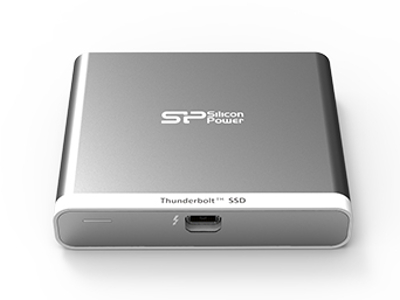Silicon Power Intros Thunderbolt-based SSD
This 120 GB SSD connects via Thunderbolt for fast data transfers.
Looking for a storage solution for your Thunderbolt-equipped desktop or laptop? Silicon Power has the ideal product for customers who need something fast and portable: the Thunder T11 solid state drive. The device is certified by both Intel and Apple, allowing customers to use it on a Thunderbolt-equipped Windows-based or Mac OS system.
"Thunderbolt technology can come in small palm size packages for true mobility," said Jason Ziller, Intel's Director of Thunderbolt Marketing. "We are pleased with Silicon Power's support for Thunderbolt technology and bringing Thunderbolt mobile storage to the next level for professional consumers."
Silicon Power believes that the Thunder T11 is the lightest and smallest Thunderbolt-based SSD on the market, measuring 74 x 62 x 15 mm and weighing a mere 0.1433 pounds. The drive arrives only in a 120 GB capacity, encased in a silver aluminum casing with "an incredible cooling system." And because it's based on NAND Flash, the drive should be completely noise free.
"Featuring extremely small and featherweight design, Thunder T11 is half the size of ordinary storage devices and only weighs 65g," reads the company press release. "Moreover, Thunder T11's Aluminum enclosure is designed to protect your files at a fraction of the weight but more importantly it offers an incredible cooling effect. In addition, Thunder T11 is entirely silent during the operation, which is particularly critical to users who work in a noise-sensitive environment."
Despite the theoretical 10 Gb/s connection speed, the new Thunderbolt drive has read speeds of up to 380 MB/s and write speeds of up to 340 MB/s. Other features include a bus-powered design (Thunderbolt provides the power), support for Windows 8/7/XP, support for Mac OS 10.3.x or later, a three year warranty, and certification for CE, FCC, BSMI and a few others.
The actual pricing and availability weren't provided, but typical outlets include Amazon, Newegg, Frys, PC Connection, Adorama and MicroCenter.
Get Tom's Hardware's best news and in-depth reviews, straight to your inbox.

Kevin Parrish has over a decade of experience as a writer, editor, and product tester. His work focused on computer hardware, networking equipment, smartphones, tablets, gaming consoles, and other internet-connected devices. His work has appeared in Tom's Hardware, Tom's Guide, Maximum PC, Digital Trends, Android Authority, How-To Geek, Lifewire, and others.
-
JohnPMyers "the new Thunderbolt drive has read speeds of up to 380 MB/s and write speeds of up to 340 MB/s"Reply
So for all the R&D they put into this, how does it compare price-wise to a standard SATA III SSD with better performance? It'll be interesting to see what the cost ends up being. -
jimmysmitty Why would you make a drive use Thunderbolt yet not utilize the super fast 10Gbps bi-directional bandwidth? That's like making it USB 3.0 but limiting it USB 2.0 speeds.Reply
It should be able to push almost 1GB/s with a decent controller. -
bigpinkdragon286 Well, presuming the largest target audience will be Mac users, as it's not a common interface on Windows PCs yet, it may not matter how the drive is engineered under the hood at all. Your concern about it's lackluster performance is preaching to the choir for those to whom it would matter, and for the technologically ignorant, it's an SSD and it connects via Thunderbolt, which will make it an automatic purchase for some users looking to justify the expensive port on their Mac.Reply -
B4vB5 Reading those 380/340 MB/s numbers, it sounds like its a Sata 3Gbps inside or just a SSD driving incapable of hitting more than that. I would get a DeLock external (2.5" Sata 6Gbps <--> Thunderbolt) housing,Reply
http://geizhals.de/delock-externes-gehaeuse-42490-a999568.html
...and stuff it with the meanest SSD you can find instead. 512GB 840 Pro or Evo or thereabout in equivalence and spacial need. 6Gbps should hit the limit at 768 MB/s and you get to choose the internal SSD and pick it to your IOPS needs.
Though a Tbolt enclosure should really be a Sata 12Gbps(when/if it comes out or equivalent) inside so it can use the full 10Gbps of the Thunderbolt interface. So far SAS 12Gbps exists but those disks seems way out of enthusiast money range and even forcing the issue seems infeasible compared to a regular ole SSD, not to mention the SAS12 disks wouldn't match the performance of the SSDs anyway, if the reported numbers are correct for writes.
Regarding Thunderbolt availability MSI has a €80 MB with Tbolt port on it,
http://geizhals.de/msi-z77a-g45-thunderbolt-7752-020r-a910734.html
...so they should come mainstream fast. -
milktea "incredible cooling effect"??Reply
SSD hardly generates any heat. That's why some SSD do not even provide SMART termo data. -
goodguy713 more then likely an intel branded ssd with a fancy case. with a decent markup. highly doubt that its anything more than that.Reply -
awesomedude911 while lightning ports may not be for windows users, it could become a useful technology for some people.Reply -
bigpinkdragon286 Lightning ports are platform independent. If there was a practical use for Lightning ports, that wasn't just an expensive duplication of functionality we already have, it would likely be very popular by now. We already have external interfaces that exceed what this particular SSD device is offering, so what is the need for the extra cost of the Lightning interface? There's probably enough people who have interest in mainstream graphics cards running over a Lightning interface, but I have a suspicion there are technical reasons it's not happening yet.Reply -
JOSHSKORN If I understand this correctly...a Thunderbolt SSD running at SATA-II SSD speeds? And to think, I've been waiting for THIS!?!?Reply -
rokit "Despite the theoretical 10 Gb/s connection speed, the new Thunderbolt drive has read speeds of up to 380 MB/s and write speeds of up to 340 MB/s."Reply
The hell? Thats a flop. Intel should show something good to justify and populate pcs with standart because right now it looks like sh*t infront of competitors.
